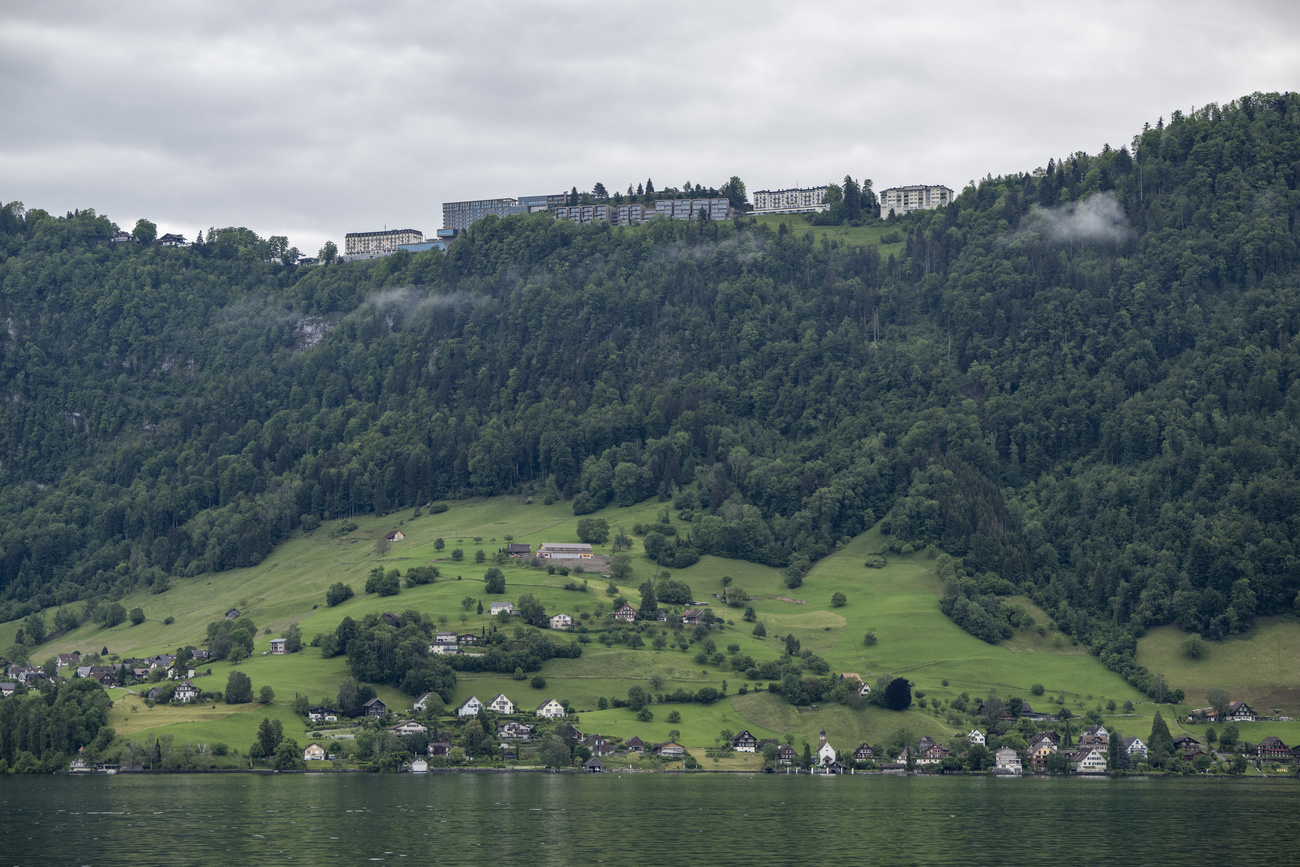
What a Ukrainian member of parliament expects from the peace summit in Switzerland

In an interview with SWI swissinfo.ch, Ukrainian politician Lisa Yasko explains why the peace conference in Switzerland is important for the people in her country and reacts to the criticism of the postponed elections in Ukraine.
Yelyzaveta “Lisa” Yasko is a politician with Ukraine’s governing party “Servant of the people”. As a member of the Ukrainian delegation to the Council of Europe, which she chaired from 2019 to 2021, the 33-year-old is an influential voice regarding Ukraine’s human rights and foreign politics.

SWI swissinfo.ch met Yasko at the Geneva Summit for Human Rights and Democracy in mid-May and asked her about her expectations for the upcoming peace conference as well as Switzerland’s position on the war in Ukraine.
SWI swissinfo.ch: On June 15-16, Switzerland is hosting the Ukraine peace conference at the Bürgenstock hotel above Lake Lucerne. What are your expectations for the summit?
Lisa Yasko: This is a difficult question. We don’t see Russia willing to end the war. And we are not going to compromise on issues which impact people’s lives in Ukraine. On the diplomatic front, I would like the conference to enable a coalition of international partners that can later work with Russia, and put forward a specific position on how we can end the war. However, this position should come with very clear points.
In this regard, the meeting in Switzerland is important to bring countries like China or Arab states around the table. The different geopolitical struggles and propaganda by Russia have led to a situation where not all countries might have had the opportunity to meet and hear each other’s positions. Enabling this dialogue is my hope. Let’s see how it goes.
SWI: From your point of view, what is the minimal result required for the meeting to be considered a success?
L.Y.: We want a maximum of countries to sign our peace plan. It would further be helpful if big international voices delivered this message to Russia. But Putin cannot be trusted. This is a big problem.
SWI: Apart from the mistrust towards Russian President Vladimir Putin, do you expect further challenges to arise at the peace summit?
L.Y.: There are many interlinked challenges around the world. The solution to peace should therefore be complex. How can we ensure for example that Russia does not cooperate with Iran to produce weapons?
Furthermore, it’s very important for me that companies have some responsibility not to export goods not only to Russia, but also to third countries, that can end up in Russia. If you want to end the war, don’t feed the war. And don’t be naive. Every tool, every ingredient, every detail of technical equipment produced by companies for instance that make microchips or processors may end up in a Russian tank or a Russian missile. If all of us, the companies and the governments, take steps to avoid this there could be progress.

More
Ukraine conference in Switzerland: diplomacy against a historic backdrop
SWI: What do you look for from a neutral country like Switzerland regarding the war in Ukraine?
L.Y.: Switzerland is heading towards a progressive rethinking of the meaning of neutrality, and I’m pleased when I hear that it doesn’t see neutrality as inaction. It means action in defence of your values. Switzerland supports the protection of human rights. Of course, among other things, I would like Switzerland to be able to cooperate militarily.
Of course, there is no neutrality for us because we know who the aggressor is. And as a Ukrainian, I want much more from Switzerland. Many delegates from the Swiss government have travelled to Ukraine. We have felt the solidarity of Switzerland, as we have felt the solidarity of many countries.
As for the Ukrainians in Switzerland: please take the opportunity to provide them with knowledge and connections so that they will be ready for the reconstruction of Ukraine. Give these people a chance to make themselves useful. Don’t postpone including them, don’t delay this. Now is the time. I advocate this in every country.
On another point, it is important to rethink the role of international organisations. I would like to see organisations based in Geneva to be more proactive.
SWI: Can you specify what you mean by “more proactive”?
L.Y.: The Red Cross, the International Committee of the Red Cross (ICRC), for example, is not operating the way we ask them to. There could be negotiations to retrieve the dead bodies at the front line, for instance. Basically, the ICRC is not operating as they were before the war because it’s too dangerous for them in Ukraine.
In Ukraine, we’re not naive anymore. If we used to think there were organisations, tools and governments that would be acting to protect human rights, we now see their limitations.
SWI: There has been some criticism concerning the fact that the planned elections for this year were postponed to an unknown date in the future. How can Ukraine be a pillar of democracy if there are no elections taking place?
L.Y.: As soon as it is possible to hold elections, we will hold them. I know that this is one of the arguments that Russia is using against us. They are trying to spread the idea that we are not having elections. The elections would normally take place this year, in spring or in autumn. We haven’t taken the decision to delay them yet.
Although elections are very important, I don’t think we can hold them at the moment, as we don’t have answers to questions concerning their safety.
Also, how can the soldiers vote? What can we do in the areas that are under daily attacks? How can Ukrainians who have fled vote from abroad? Are you in Switzerland ready to organise polling stations for Ukrainians living here? What about international observers? Would they go to the front line to observe the voting? And would soldiers also be able to stand as candidates? In addition, the budget must also be taken into consideration. I don’t think Ukrainians would understand if we spent money on the elections right now.

More
The latest on Ukraine peace conference in Switzerland
SWI: You are a member of the governing party “Servant of the People”, alongside Ukrainian President Volodymyr Zelensky. Your political opponents may have a different opinion on the issue of the elections.
L.Y.: You need to go to Ukraine to understand that people are in survival mode there. They don’t really care who is in political power right now. They want the war to be over, but not at the cost of just ending it where it is, not at the cost of giving up land, not at the cost of forgetting how many people have been killed and how many have lost their loved ones.
You can’t hold elections during war and martial law. And if the level of aggression was lower or more stable, there might be a possibility. But I’m more worried about protecting democracy during the elections than not having elections now, because I think at this stage, Russia could start shooting when people go to the polls. Let’s first get more clarity on how to stop Putin. Then we can hold elections.
SWI: You are a frequent visitor to Switzerland and have had some insight in Switzerland’s direct democracy. Do you think a similar system would work in Ukraine once the war is over?
L.Y.: Ukraine is very democratic by nature. Unfortunately, our institutions aren’t that strong, but we are trying to make them stronger. Before the war, we were quite a decentralised country. We provided budgets to the municipalities and they could decide how to spend the money. I therefore think we have made great progress in participatory democracy.
Of course, many things work differently now due to the war. Our budgets are limited, we are putting everything into the defence industry.
To answer your question: I don’t think the Swiss model would be applicable everywhere because you are just too special. I know that it can be very problematic in Switzerland when issues are first discussed at cantonal level and then at federal level. Things get lost along the way.
Saying this, we are very digitalised in Ukraine – I think that might be something you should learn from us.
Edited by Virginie Mangin
We want to know, what you, our readers, think: Is the Ukraine peace conference a futile endeavour or a chance for peace? Join the discussion on our dialogue platform:

In compliance with the JTI standards
More: SWI swissinfo.ch certified by the Journalism Trust Initiative
































You can find an overview of ongoing debates with our journalists here . Please join us!
If you want to start a conversation about a topic raised in this article or want to report factual errors, email us at english@swissinfo.ch.